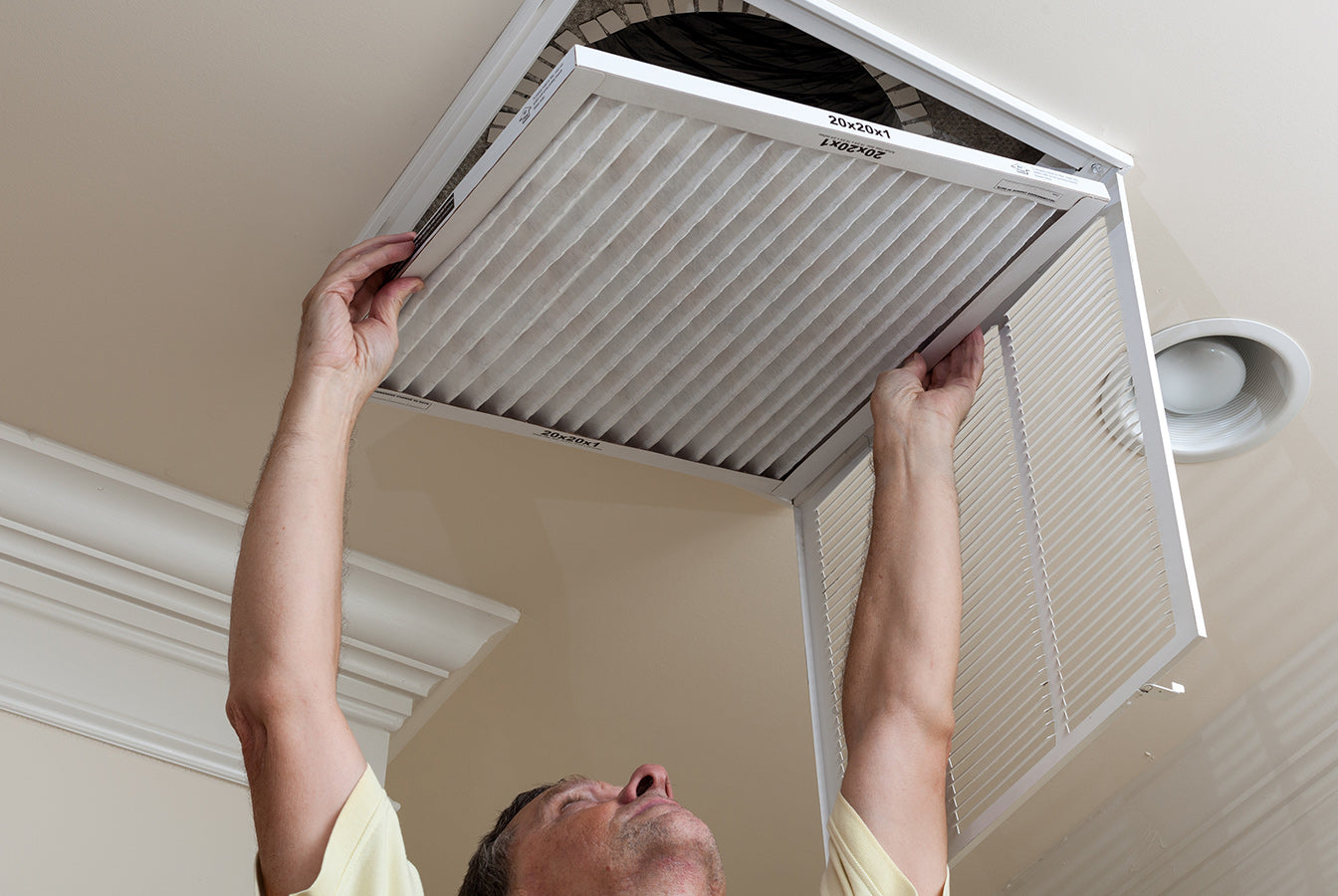Your HVAC system does more than keep your home warm or cool. It plays a major role in indoor air quality, energy efficiency, and even your health (especially during allergy season).
Whether you're dealing with dry winter air or pollen-packed spring breezes, understanding how your HVAC system works gives you the power to breathe better and spend smarter.
What Is an HVAC System?
An HVAC system is designed to control the indoor climate of a building, ensuring comfort through the regulation of temperature, humidity, and air quality.
Whether it’s a frigid winter evening or a sweltering summer afternoon, an HVAC system ensures that indoor spaces remain at a comfortable temperature, preventing extreme fluctuations that can affect both health and well-being.
The term HVAC is an acronym for Heating, Ventilation, and Air Conditioning, with each element playing a crucial role in maintaining indoor comfort.
Heating Systems:
Heating systems, such as furnaces, boilers, or heat pumps, provide warmth by generating and distributing heat throughout the home. This function is especially vital during colder months, preventing indoor temperatures from dropping to uncomfortable or even hazardous levels.
Heating systems use fuel sources like natural gas, oil, or electricity to operate efficiently, ensuring homes remain warm while balancing energy consumption.
Ventilation is another key component of HVAC systems, ensuring continuous airflow throughout a structure. Proper ventilation helps replace stale indoor air with fresh outdoor air, reducing the accumulation of pollutants such as dust, allergens, carbon dioxide, and volatile organic compounds (VOCs).
Without adequate ventilation, indoor air can become stagnant, leading to discomfort, increased respiratory issues, and higher risks of mold or mildew growth.
Cooling Systems:
Air conditioning plays a critical role in cooling indoor spaces during warm weather, removing excess heat and humidity from the air. Air conditioning units work by extracting warm air from the indoor environment, cooling it using refrigerant cycles, and redistributing it back into the living space.
In humid climates, air conditioning systems also assist in dehumidification, preventing excessive moisture that can lead to mold growth and structural damage.
Knowing How Your HVAC Works
Understanding your HVAC system is essential for maximizing energy efficiency, reducing costs, and maintaining a healthy indoor environment. By familiarizing yourself with how the system operates, you can make informed adjustments that improve performance and lead to substantial energy savings.
Energy Efficiency
Knowledge of system operations allows for adjustments that can lead to significant energy savings. Small changes, such as adjusting thermostat settings, sealing duct leaks, or upgrading to energy-efficient components, can make a big difference in overall energy consumption.
Cost Savings
Regular maintenance and timely repairs prevent costly breakdowns and extend the system's lifespan. By scheduling routine inspections and addressing minor issues before they escalate, homeowners can extend the lifespan of their HVAC system and avoid unexpected expenses.
Knowing when to change air filters, clean ducts, and monitor refrigerant levels ensures that the system runs smoothly and efficiently for years to come.
Improved Air Quality
Proper ventilation and filtration help remove allergens, dust, and airborne pollutants, creating a cleaner and healthier living space. This is particularly important for individuals with allergies, asthma, or other respiratory conditions, as poor air quality can exacerbate symptoms.
How Does an HVAC System Actually Work?
An HVAC system operates through a series of components working in unison:
Thermostat: Acts as the control center, allowing users to set desired temperatures.
Furnace: Heats air using fuel sources, usually natural gas.
Heat Exchanger: Transfers heat from the furnace to the air.
Evaporator Coil: Cools the air when the air conditioning is active.
Condensing Unit: Releases the heat extracted from the indoor air to the outside.
Refrigerant Lines: Transport refrigerant between system components to cool.
Ductwork: Distributes conditioned air throughout the home.
Ventilation: Manages the exchange of indoor and outdoor air, maintaining air quality.
Comparing HVAC System Types
Selecting the appropriate HVAC system depends on various factors, including climate, home size, and energy efficiency goals. Here are common types of HVAC systems:
1. Split Systems
A split HVAC system consists of separate indoor and outdoor units. The indoor unit houses the evaporator coil and fan, while the outdoor unit contains the compressor and condenser coil. These systems provide efficient heating and cooling, making them a cost-effective option for many homeowners.
They are also suitable for a variety of home sizes, offering flexibility in installation. However, split systems require ductwork, which can be challenging to install in existing structures, particularly in older homes without pre-existing ducts.
2. Ductless Mini-Split Systems
Ductless mini-split systems include an outdoor unit connected to one or more indoor units without the need for ductwork. They offer flexible installation options and are highly energy-efficient, especially for zone heating and cooling, allowing homeowners to control temperatures in different rooms independently.
These systems are particularly ideal for homes that do not have existing ductwork. Despite these advantages, ductless mini-split systems tend to have higher upfront costs compared to traditional HVAC setups. Additionally, they may not be the best solution for larger residences requiring whole-home climate control.
3. Packaged Systems
A packaged HVAC system houses all components within a single unit, typically placed outdoors or in a dedicated indoor space. This design is space-saving, making it an excellent choice for homes with limited indoor room for HVAC equipment. The installation process is also simplified, reducing labor costs.
However, packaged systems may consume more energy than other HVAC options, leading to potentially higher utility bills. They offer limited customization options, which may not be ideal for homeowners looking for a highly tailored climate control system.
4. Heat Pump Systems
Heat pump systems transfer heat between the indoors and outdoors, providing both heating and cooling functions. These systems are highly energy-efficient and environmentally friendly, making them a sustainable choice for homeowners looking to reduce their carbon footprint.
They work particularly well in moderate climates, where extreme temperatures are less frequent. However, in regions with very cold winters, heat pumps can become less efficient, requiring supplemental heating sources. While they offer long-term energy savings, the initial installation costs for a heat pump system can be relatively high.
How to Maintain Your HVAC System
Regular maintenance is crucial for the optimal performance, efficiency, and longevity of your HVAC system. Keeping up with maintenance not only prevents costly breakdowns but also ensures better air quality and energy savings.
1. Replace Your Air Filters
Regularly replacing air filters is one of the simplest yet most effective ways to enhance air quality and maintain system efficiency. Homeowners should check filters monthly and replace them every 1-3 months, depending on usage, pet presence, and indoor air quality concerns.
2. Schedule Regular Inspections
Scheduling professional inspections at least once or twice a year helps identify and address potential issues before they turn into costly repairs. HVAC technicians check for refrigerant leaks, electrical connections, airflow problems, and thermostat calibration to ensure the system is running optimally.
3. Clean and Seal Your Ductwork
Clean ductwork is essential for maintaining proper airflow and preventing contaminants from circulating in your home. Regular duct cleaning—typically every 3-5 years or as needed—can help maintain indoor air quality and improve overall HVAC performance. Sealing any leaks or cracks in the ductwork can also enhance efficiency and reduce energy waste.
4. Upgrade Your Filters
Investing in high-performance air filters, such as those we offer at Yoor Air like The Protector, The Pet Whisperer, and The Clean Freak can significantly improve indoor air quality.
These filters are designed to trap bacteria, allergens, pollen, and other harmful particles more effectively than standard filters.
High-efficiency filters not only contribute to a healthier home environment but also help maintain HVAC system components by preventing dust and debris buildup, reducing wear and tear.
By following these maintenance practices, homeowners can ensure their HVAC system operates at peak efficiency, reducing energy costs, improving air quality, and extending the system’s lifespan.
Don’t Just Heat and Cool - Control Your Air
Understanding your HVAC system is essential for maintaining a comfortable, efficient, and healthy home environment. By familiarizing yourself with the system's components, types, and maintenance requirements, you can make informed decisions that enhance performance and longevity for your system.
FAQs
How often should I replace my HVAC air filter?
For optimal performance, standard HVAC air filters should be replaced every 1-3 months. Factors such as pet dander, dust accumulation, and overall air quality can impact this timeline. High-quality filters, like those from Yoor Air, may offer extended lifespans and better filtration, depending on usage and environmental conditions.
What are signs my HVAC system needs attention?
Several warning signs indicate that your HVAC system may require maintenance. These include unusual noises such as banging or rattling, inconsistent temperatures throughout your home, a sudden increase in energy bills, and poor indoor air quality.
Can I improve HVAC efficiency without replacing the system?
Yes, there are several ways to enhance your HVAC system’s efficiency without investing in a full replacement. Regular maintenance, such as cleaning or replacing air filters, sealing duct leaks, and upgrading to a programmable thermostat, can help improve performance.



